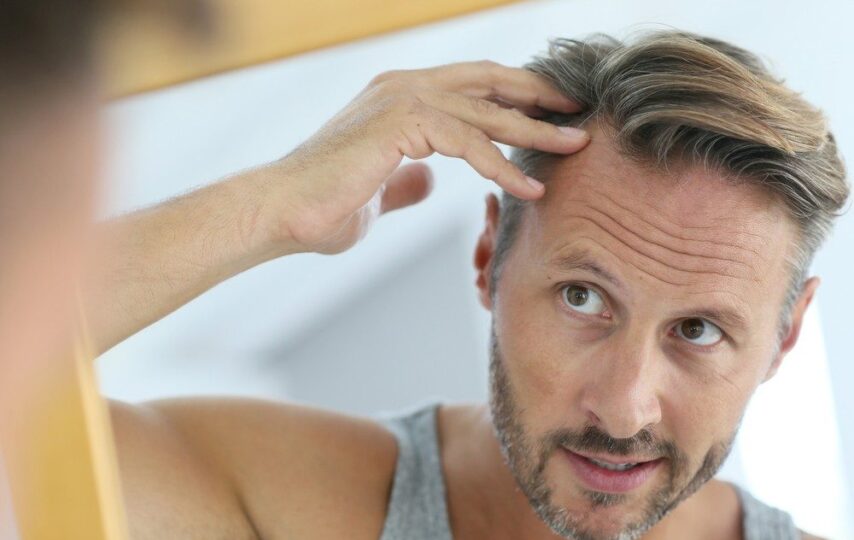Some people with autoimmune conditions like rheumatoid arthritis are likely to experience hair loss as a symptom of concern. However, most of the time, it’s caused by arthritis medications. According to experts, hair loss during arthritis treatment is not a typical, long-term complication. Even so, those who need to maintain a well-groomed look are eager to treat hair loss quickly and effectively. The article will analyze the link between rheumatoid arthritis and hair loss, offering Scalp Micropigmentation New York for those who are experience problems.
What are rheumatoid arthritis tablets?
Rheumatoid arthritis is classified as an autoimmune disease. The patient’s immune system attacks the joints inadvertently, resulting in discomfort, swelling, and trouble moving. Rheumatoid arthritis primarily affects the joints, but it can also damage other regions of the body if the inflammation persists. Rheumatoid arthritis patients also meet hair loss issues.
Link Between Rheumatoid Arthritis and Hair Loss
Rheumatoid arthritis does not cause hair loss as one of its symptoms. Experts acknowledge hair loss as a common side effect of arthritis treatment. Hair loss in arthritis patients is thinner than typical, and the hair does not come out in large sections. On the other hand, people with hereditary baldness would experience more and faster hair loss due to arthritis medication. As a result, men often experience male pattern baldness, either along the hairline or at the top of the head. While women often have thinning hair on the temples and forehead.
Patients with rheumatoid arthritis are frequently prescribed DMARDs or biologics. DMARDs are a type of drug that suppresses the immune system and reduces chronic inflammation. Methotrexate and leflunomide are two common DMARDs. These medications limit the proliferation of cells in the body, which prevents hair follicle cells from growing. When this happens, the hair follicle’s base can weaken, leading to additional hair loss.
Biologic medications are a class of drugs made from living cells that have been genetically engineered. These medications stop the immune system from causing inflammation. Hair loss can be an adverse effect of biological medications such as etanercept and adalimumab.
Other autoimmune disorders can also lead to hair loss
Alopecia areata is an autoimmune disorder in which your immune system targets your hair follicles. If you have lupus, your scalp may be damaged, and hair loss may occur. Hair loss is, in fact, sometimes an early indication of lupus that occurs before the onset of the disease.
Other possible causes of hair loss include scalp infections, thyroid problems, anemia (iron deficiency), cardiovascular problems, depression, cancer treatment, tying your hair too tightly, and more. If you have unexplained hair loss, make an appointment with your doctor. It could be a sign of an underlying health condition.
Hair loss treatment
Changing medications for rheumatoid arthritis
Hair loss can lead to several psychological effects for patients, such as depression, anxiety, or low self-esteem. At that time, the patient needs to see a doctor and recommend a change in medication if the cause of hair loss is arthritis medication.
Supplement
Folic acid or biotin supplements may help reduce the side effects of some RA treatments. These B vitamins can help protect against hair loss.
Folic acid can also help reduce some of the other side effects of people being treated for arthritis, such as headaches, shortness of breath, and fatigue.
Scalp Micropigmentation
Scalp Micropigmentation can improve thinning hair, baldness for people in the process of arthritis treatment.
Scalp micropigmentation is a high-tech method to improve the thinning, thinning, balding appearance of hair. The specialist will deliver the pigments into the scalp area through microfibers. After the treatment, the scalp area will have small dots like hair follicles, helping to create a feeling of thicker hair and not revealing the bald spot. However, this method does not help prevent hair loss. This method makes the hair look thicker and more natural.
Using scalp micropigmentation helps to regenerate natural hair follicles, thickening thinning areas. Experts implant natural color pigments into the scalp epidermis. On the scalp will appear dots of similar color to your hair color, blending naturally into areas of thinning hair.
The specialist conducts scalp pigmentation through an electric tattoo device with a micro-needle for a very natural effect, reducing the signs of hair loss immediately. This method covers the hair loss areas of the scalp. Scalp micropigmentation is a highly specialized treatment, so you need to find out and choose a reputable place to send your hair.
Other tips that can help minimize hair loss
Do not rub too hard when washing your hair
Do not blow-dry your hair too hot.
Do not brush your hair too much; use a specialized hairbrush for people with hair loss.
Quit the habit of pulling and pulling hair
Always use hair conditioner to avoid tangles
Conclusion
Hair loss is uncommon in persons with RA, although it can be a symptom of the disease or a side effect of RA drugs. Hair loss is usually modest, and hair can regrow when a person stops using the medicine.
Keep in mind that you should not stop taking any medication unless your doctor advises you to. If necessary, the doctor can recommend alternative medicines and refer the patient to a dermatologist or a hair loss specialist. They can assist you in weighing the advantages and disadvantages of changing your pharmaceutical regimen. Of course, your doctor’s suggestion will be based on the severity of your hair loss, how severely it impacts your quality of life, and how well your current medicine decreases your inflammatory symptoms. Rheumatoid arthritis is a type of arthritis that affects the joints.
Rheumatoid arthritis treatment is typically lifelong, and there are currently no studies relating treatment length to hair loss. Hair loss can impact people in different ways. If your hair loss makes you feel uncomfortable leaving the house or requires you to wear a headscarf, tell your doctor about it, so they know exactly what symptoms you’re experiencing. Your doctor must be aware of the situation and recommend the appropriate treatment.








